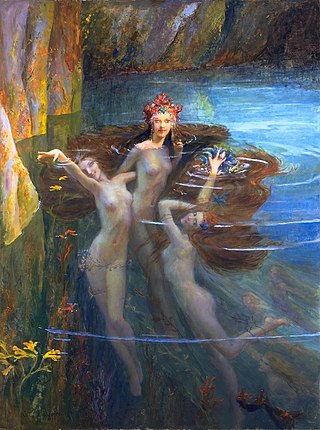Related Research Articles
Alexandra is a female given name of Greek origin. It is the first attested form of its variants, including Alexander. Etymologically, the name is a compound of the Greek verb ἀλέξειν and ἀνήρ. Thus it may be roughly translated as "defender of man" or "protector of man". The name Alexandra was one of the epithets given to the Greek goddess Hera and as such is usually taken to mean "one who comes to save warriors". The earliest attested form of the name is the Mycenaean Greek 𐀀𐀩𐀏𐀭𐀅𐀨, written in the Linear B syllabic script. Alexandra and its masculine equivalent, Alexander, are both common names in Greece as well as countries where Germanic, Romance, and Slavic languages are spoken.
Gerda is a feminine given name. Notable people with the name include:

Maria is a feminine given name. It is given in many languages influenced by Christianity.
Fischer is a German occupational surname, meaning fisherman. The name Fischer is the fourth most common German surname. The English version is Fisher.
Helga is a female name, used mainly in Scandinavia, German-speaking countries and the Low Countries. The name was in use in England before the Norman Conquest, but appears to have died out afterwards. It was re-introduced to English-speaking nations in the 20th century from Germany, the Netherlands, and the Nordic countries. Scandinavian male equivalent is Helge, or Helgi. Eastern Slavic names Olga (Ольга) and Oleg (Олег) are derived from it.

Anne, alternatively spelled Ann, is a form of the Latin female name Anna. This in turn is a representation of the Hebrew Hannah, which means 'favour' or 'grace'. Related names include Annie.

Margot is a feminine given name, a French diminutive of Marguerite that has long been used as an independent name. Variant spellings in use include Margo and Margaux. It is also occasionally a surname.

Agnes is a feminine given name derived from the Greek Ἁγνή Hagnḗ, meaning 'pure' or 'holy'. The name passed to Italian as Agnese, to French as Agnès, to Portuguese as Inês, and to Spanish as Inés. It is also written as "Agness". The Greek name descends from the Proto-Indo-European *h₁yaǵ-, meaning 'to sacrifice; to worship', from which also the Vedic term yajña originates. The name is mostly used in Greece and in countries that speak Germanic languages.
Hans is a Germanic male given name in Afrikaans, Danish, Dutch, Estonian, Faroese, German, Norwegian, Icelandic and Swedish-speaking populations. It was originally short for Johannes (John), but is now also recognized as a name in its own right for official purposes. The earliest documented usage was in 1356 in Sweden, 1360 in Norway, and the 14th century in Denmark.
Baer or Van Baer is a surname. Notable people with the surname include:

Hannah, also spelled Hanna, Hana, Hanah, or Chana, is a feminine given name of Hebrew origin. It is derived from the root ḥ-n-n, meaning "favour" or "grace". A Dictionary of First Names attributes the name to a word meaning 'He (God) has favoured me with a child'. Anne, Ana, Ann, and other variants of the name derive from the Hellenized Hebrew: Anna (Ἅννα)

Nancy is an English language given name for women. The name Nancy was originally a diminutive form of Annis, a medieval English vernacular form of Agnes. In some English dialects, "mine" was used instead of "my" and "Mine Ancy" eventually became Nancy. The name was also later used as an English diminutive of Anne or Ann. It has been used as an independent name since the 18th century. In some instances it replaced variant Nanny, which was associated with the stereotype of a common, promiscuous woman from the 1600s onward. Spelling variants in use include Nancea, Nancee, Nancey, Nanci, Nancie, Nancsi, Nancye, Nanncey, Nanncy, Nansee, and Nansi. Similar names include Nan, Nance, Nanette, Nannerl, and Nannie.
Gertrude is a feminine given name which is derived from Germanic roots that meant "spear" and "strength". "Trudy", originally a diminutive of "Gertrude," has developed into a name in its own right.

Anna is a feminine given name, the Latin form of the Greek: Ἄννα and the Hebrew name Hannah, meaning "favour" or "grace".

Irene, sometimes written Irini, is derived from εἰρήνη, the Greek word for "peace". Eirene was the Greek goddess of peace. Irene was also the name of an 8th-century Byzantine empress, as well as the name of several saints.

Marie is a variation of the feminine given name Maria.
Monika is a female name in German, Scandinavian, Czech, Slovak, Polish, Slovene, Croatian, Estonian, Lithuanian, Latvian and Hungarian (Mónika) which can also be seen in India. It is a variation of Monica, stemming from the word "advisor" in Latin and "unique" in Greek.
Lotte is a female given name. It is a diminutive of the names Lieselotte and Charlotte, which itself is a female form of the male name Charlot, a diminutive of Charles.
The feminine given name Inga is a variant of the German and Scandinavian name Inge. It derives from the Germanic deity Ing. Notable people with the name include:

Doris is a predominantly feminine given name of Greek origin meaning Dorian woman. The name of the ethnic group is said to be derived from the name of the mythical founder Dorus, taken from Greek dōron, meaning gift. Doris was a sea goddess, wife of Nereus and mother of the Nereids in Greek mythology.
References
- ↑ Hanks, Patrick; Hodges, Flavia; Mils, A. D.; Room, Adrian, eds. (2002). The Oxford names companion. Oxford: Oxford Univ. Press. p. 751. ISBN 0198605617.